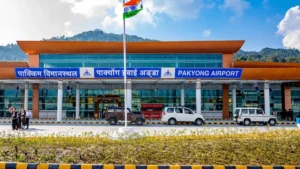Prime Minister Narendra Modi signed the Artemis Accords during his state visit to the United States, marking India’s commitment to global space cooperation and lunar exploration. The accords, initiated by NASA and the US Department of State, provide a framework for collaboration in civil space exploration and use, with a focus on returning humans to the Moon and expanding space exploration to Mars and beyond.
The Artemis Accords: A Multilateral Agreement

Grounded in the United Nations Outer Space Treaty of 1967, the Artemis Accords serve as a non-binding multilateral arrangement between the US government and other world governments participating in the Artemis program. This US-led initiative aims to land humans on the Moon by 2025 and foster future space exploration endeavors.
As of June 22, 2023, 26 countries and one territory have signed the accords, with representation from Europe, Asia, North America, Oceania, Africa, and South America. By signing the accords, countries demonstrate their commitment to key principles and guidelines for lunar missions.
Principles and Guidelines for Lunar Missions
The Artemis Accords outline several fundamental principles that participating countries are expected to uphold. These principles include:
- Peaceful Exploration of Space: Countries pledge to conduct their space activities in a peaceful manner and avoid any harmful interference or conflict.
- Transparency and Interoperability: Participants agree to promote transparency by openly sharing scientific data, emergency assistance, and orbital debris tracking information. They also commit to enhancing interoperability among space systems to facilitate safe and efficient cooperation.
- Sustainable Utilization of Space Resources: Signatory nations commit to the responsible and sustainable use of space resources, including lunar regolith and water ice, while adhering to international law and relevant domestic regulations.
- Preservation of Historic Sites and Artifacts: Countries agree to protect and preserve historic lunar sites and artifacts, recognizing their scientific, cultural, and historical value.
India’s Commitment to Global Space Cooperation
India’s decision to sign the Artemis Accords signifies its dedication to collaborating with other nations in space exploration. By joining the accords, India gains the opportunity to participate in future lunar missions alongside countries like the United States, fostering knowledge sharing, technological advancements, and scientific research.
Furthermore, India’s space agency, the Indian Space Research Organisation (ISRO), and NASA have agreed to launch a joint mission to the International Space Station (ISS) in 2024. This collaboration exemplifies India’s growing role in international space endeavors and opens avenues for scientific and technological cooperation between the two nations.
Expanding Collaborations and Semiconductor Ecosystem
During Prime Minister Modi’s state visit, additional partnerships between the United States and India were also announced. Several US companies are set to collaborate with India to establish a semiconductor ecosystem that promotes supply chain diversification.
Micron Technology, with support from the Indian National Semiconductor Mission, has recently unveiled plans for an investment of over $800 million. This investment, coupled with additional financial support from Indian authorities, will result in the establishment of a $2.75 billion semiconductor assembly and test facility in India. These efforts aim to strengthen India’s semiconductor industry and contribute to global supply chain resilience.




 7 Countries that Celebrate Holi Like Ind...
7 Countries that Celebrate Holi Like Ind...
 Google Launches Nano Banana 2 Powered by...
Google Launches Nano Banana 2 Powered by...
 Pakyong Airport to Be Renamed After Free...
Pakyong Airport to Be Renamed After Free...








